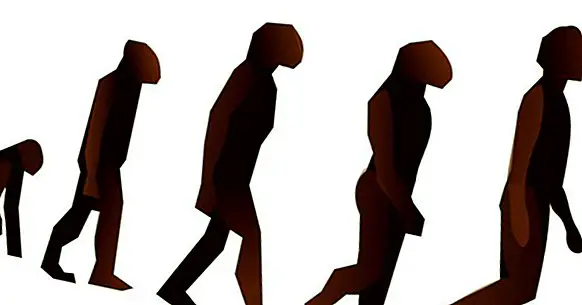Differences between evolutionary psychology and evolutionary psychology
Through the corridors of the faculties of Psychology of Spain and Latin America can be seen, every weekday, a series of people who wander totally disoriented by corridors and classrooms. They are mostly young students, but there is something in their eyes that has nothing to do with the expression of self-sufficiency and bravery that could be expected twinkling in the face of any twentysomething.
What is the reason for this kind of inner tension? Very simple: your knowledge of psychology is grounded in something that is essentially EVIL; hence, there are certain ideas and concepts that can not be understood, no matter how hard they try. There is something that escapes them. And it is that these poor devils still do not know that the Evolutionary psychology and the Evolutionary Psychology they are not the same.
Luckily sooner or later there always comes a salvific teacher or professor who ends up clarifying these concepts in what will be one of the brief lessons to which more profit will be taken during the race. However, the difference between evolutionary and evolutionary psychology is better known as soon as possible (and preferably before suspending an examination for ignoring it), since the two deal with totally different things and, in fact, it is not clear that the Evolutionary psychology is a branch of psychology itself.
To understand well the relationship between both, it's good to delve a bit into a concept to which the two appeal: evolution .
Two basic types of evolution
The concept of "evolution" is sufficiently abstract to be able to be used to explain a great variety of processes, but basically defines a development through which different changes are happening more or less gradually . In the fields of study of Psychology, however, evolution usually refers to two essentially different processes: the changes that occur in the development of an organism and the changes that occur in the form and behavior of species, from generation to generation.
Phylogeny and ontogeny
When we talk about the first type of evolution, which refers to the individual organisms that develop from their zygote form to reach old age, we talk about ontogeny , whereas when we talk about processes of change between generations and species that are happening to each other, we talk about their phylogeny .
The basic idea that serves to distinguish evolutionary psychology from evolutionary is as follows: Evolutionary psychology studies the psychology of the human being in relation to its ontogenetic development , while evolutionary psychology studies human behavior in light of the evolution of species, that is, in light of their phylogenetic development.
The object of study of the evolutionary Psychology are the patterns of behavior and subjectivation that are associated to each phase of the growth of a human being, while the Evolutionary Psychology, rather than offering a field of study, proposes an approach based on what is known about the evolutionary history of populations from which his lineage proceeds to obtain hypotheses about how people behave.
Where does the confusion come from?
This is a problem that has to do with the translation into Spanish of words used in the dominant academic environment, which uses English. What we know today as evolutionary psychology was originally called developmental psychology, which means that in this language there is practically no confusion.
However, when the first researchers started talking about evolutionary psychology, in Castilian already existed a very similar term to designate to the previous branch of the psychology. Hence, in Spain and Latin America the word "evolutionist" is used, to distinguish it from the evolutionary without renouncing its basic meaning, which is related to a process of change.



















